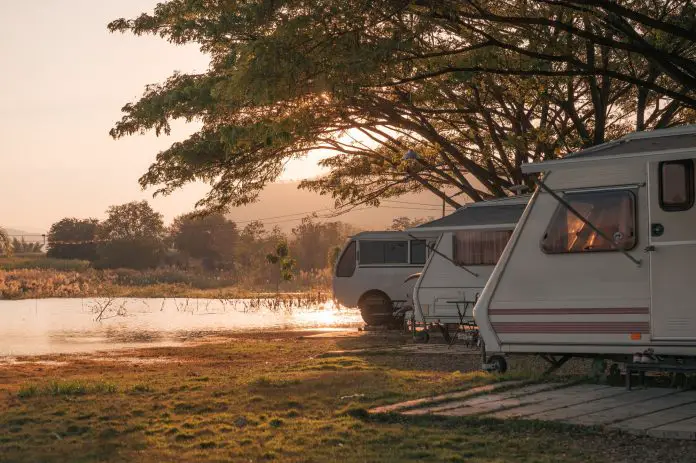Launching your own campground is not just a business venture—it’s an exhilarating journey! Picture creating a haven where families and friends bond with nature and forge unforgettable memories. To succeed, you must master key steps, from choosing the perfect location to designing interesting activities for your guests.
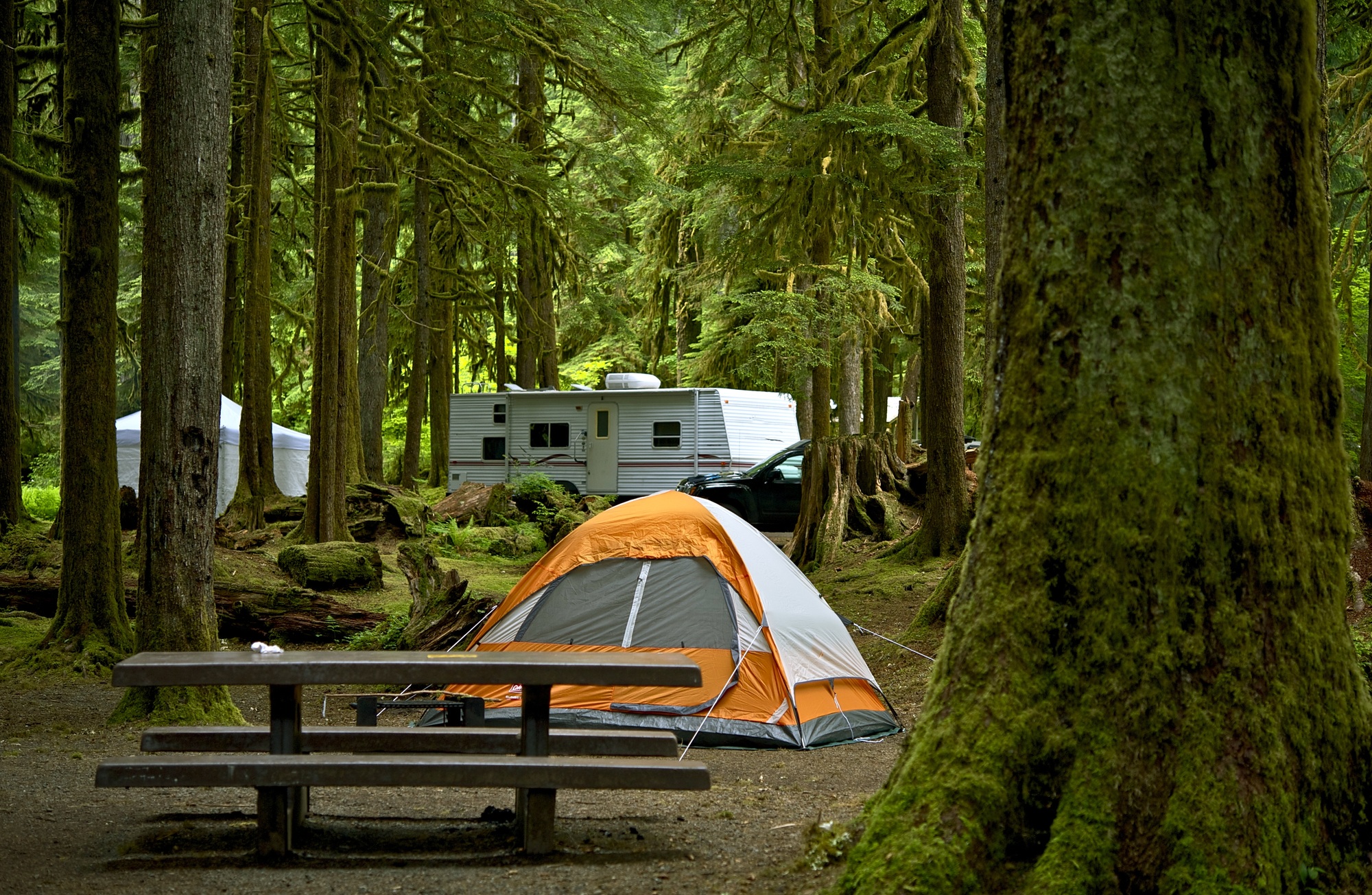
This article reveals the necessary steps to turn your campground dream into reality. Find how to craft a solid business plan, steer local regulations, and attract visitors. With strategic preparation, you can build a cherished campground that appeals to adventurers and nature enthusiasts alike!
Key Takeaways
- Explore campground operations to identify what sets your offerings apart and attracts guests.
- Develop a complete business plan detailing funding strategies and creative marketing approaches.
- Lift guest experiences by investing in amenities such as WiFi and unique accommodations.
- Stay proactive by obtaining all required licenses and permits to make sure compliance with local regulations.
Research and Planning

Starting a campground is like planting a seed; with effective research and planning, it can grow into a flourishing business. But where do you start?
Begin by crafting a solid business plan that outlines your vision, target market, and financial projections. Think of it as your GPS, guiding you through the twists and turns of the campground industry.
Next, zero in on the location. Just as a flower craves sunlight, your campground needs the perfect spot to thrive. Is it near national parks, hiking trails, or other natural attractions?
These features can attract customers excited for outdoor adventures. Don’t forget to check local zoning laws and building permits to make sure your site is compliant.
Now, let’s tackle startup costs. Accurately estimating land expenses and the costs for campground service buildings, restrooms, and amenities is critical. You might need to explore small business loans or create a capital expenditure budget to manage these expenses. Be ready for unexpected costs that can sprout up like weeds, so include a financial cushion in your budget.
As you plan, think about the amenities you want to offer. Will you provide RV sites, tent sites, or even a camp store? Consider hosting community events like outdoor movie nights to create a dynamic atmosphere. These activities can turn initial-time visitors into loyal customers.
Conducting a thorough market analysis is necessary. Who are your potential customers?
Are they families seeking weekend getaways or solo adventurers craving peace in nature?
Understanding your target audience will help you tailor your marketing strategies and amenities to their needs.
At last, prioritize environmental protection. Your campground should respect its natural surroundings, ensuring your business positively impacts the local ecosystem. This commitment not only benefits the environment but also boosts your reputation among eco-conscious campers.
Starting a campground involves many steps, but with diligent research and planning, you can lay a strong foundation for your venture. Accept the journey, and soon you’ll be welcoming campers to enjoy the great outdoors!
Conduct market research on the campground industry
Conducting market research in the campground industry is like Begining on a treasure hunt. You need to find what campers crave and how your competitors stack up. Start by analyzing local attractions and existing campgrounds. Ask yourself: What makes your campground unique?
This knowledge will empower you to create a compelling business plan that attracts customers.
Define your target market. Are you appealing to families, thrill-seekers, or luxury campers?
Understanding your audience’s needs is critical. Use tools like surveys and community feedback to gather insights. Plus, familiarize yourself with zoning laws and building permits to make sure compliance. For complete details on permits, check out this necessary checklist.
Keep an eye on recreational trends and upcoming events. This vigilance can spark community activities like outdoor movie nights or hiking trails, turning your campground into a popular destination. Remember, a campground nurtured by thorough research is like a flourishing garden; it thrives with the right care!
Identify your target market and competition
Identifying your target market is like choosing the right path in a dense forest. Who are you inviting to your campground?
Families seeking adventure or solo travelers craving tranquility?
Understanding your audience allows you to tailor features like bathroom facilities and outdoor activities to their needs.
Next, evaluate your competition. Think of it as a strategic chess game—knowing your rivals helps you plan your next move. Investigate nearby campgrounds: do they excel in tent sites or RV parks? By identifying their strengths and weaknesses, you can carve out a unique niche, ensuring you stand out in the dynamic campground industry.
Don’t forget for consideration local attractions and events. Are there breathtaking hiking trails or exciting festivals nearby?
This knowledge empowers you to market your campground effectively, drawing in potential guests. A well-researched business plan serves as your compass for success!
For further guidance on finding your way zoning laws and permits critical for your campground, check out this valuable resource: zoning and permits.
Determine the feasibility of your campground business
To determine the feasibility of your campground business, start by estimating your costs. What will you invest in land, permits, and necessary infrastructure like restrooms and a camp store?
Local zoning laws and building permits are critical checkpoints. Consider your business plan as a puzzle; each piece—like startup costs and market analysis—must fit together to create a solid foundation for your vision.
Next, pinpoint your target market. Who will be drawn to your campground?
Are you catering to families seeking outdoor activities or adventure enthusiasts in search of hiking trails?
Understanding your audience lets you tailor your offerings, from tent sites to RV sites. Investigate local attractions and upcoming events to entice visitors. For a deeper look at costs, explore this resource.
At last, secure the necessary permits and licenses. From liability insurance to environmental compliance, each requirement serves as a safety net, shielding you from legal troubles. With thorough research and strategic planning, your campground can thrive in nature’s accept.
Choosing the Right Location
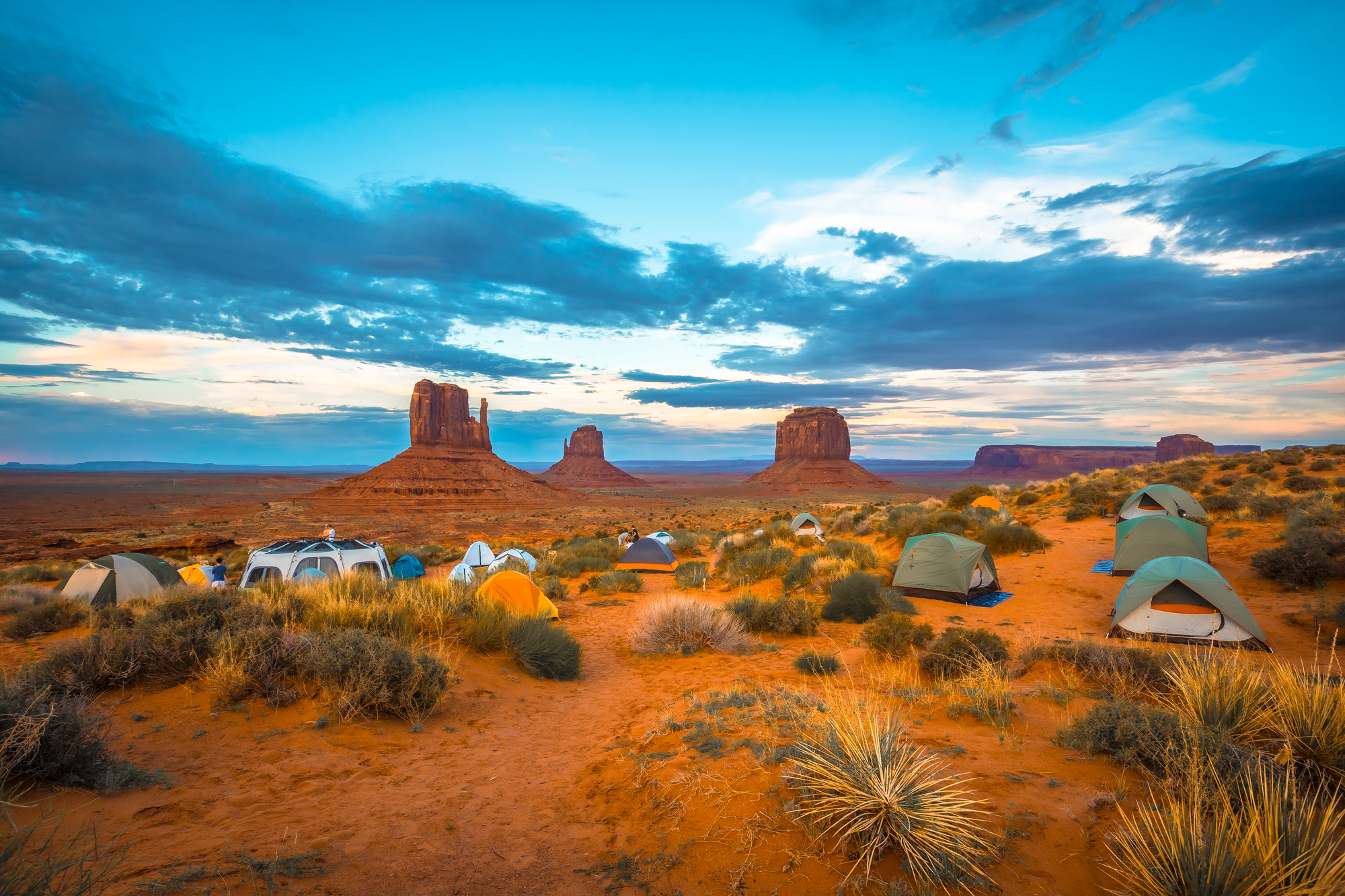
Choosing the right location for your campground is like selecting the ideal spot for a picnic; it can transform the experience. Imagine a campsite by a sparkling lake or tucked away in grand mountains—inviting, right?
But how do you find that dream location?
Consider these necessary factors.
1. Accessibility: Is your campground easy to reach?
Evaluate the roads leading there. Are they well-maintained?
A smooth road acts like a welcoming mat for visitors; tough access might send them packing!
2. Local Zoning Laws: Before you jump in, investigate the local zoning laws. These regulations dictate what you can do with your land, much like a game’s rulebook. Ignoring them could cost you your chance!
3. Natural Attractions: Your campground should be close to natural attractions like hiking trails, lakes, or national parks. These features are the icing on the cake, boosting your campground’s appeal to potential guests.
4. Competition Analysis: Look at existing campgrounds in the area. Are they thriving?
A busy campground signals a healthy market. If they’re struggling, rethink your choice. It’s like a race; you want to be in a lane where others are successfully running!
5. Amenities and Infrastructure: What facilities will you provide?
Will there be bathroom facilities, a camp store, or even a swimming pool? These amenities attract diverse target markets, from families to outdoor enthusiasts.
6. Environmental Concerns: Consider your campground’s environmental impact. Setting up a tent site in a flood zone is a disaster waiting to happen. Understanding the place and potential hazards is critical for safety and sustainability.
7. Seasonal Considerations: Is your campground suitable for year-round use or only during specific seasons?
If you plan to host events like outdoor movie nights or community gatherings, make sure your location can accommodate those activities.
Finding the perfect campground location requires a mix of accessibility, compliance with local laws, and awareness of the environment. Each factor plays a critical role in creating a successful campground that not only attracts visitors but also keeps them coming back for more!
Consider factors like accessibility, zoning, and environmental impact
When launching a campground, focus on critical factors like accessibility, zoning, and environmental impact. Is your site easy for visitors to reach?
Think of it as a bridge; if it seems intimidating, fewer campers will cross. Examine local zoning laws to make sure your campground complies with community regulations. Assess your campground’s environmental impact as well. Protecting nature isn’t just the right thing to do; it attracts eco-conscious campers excited to immerse themselves in the great outdoors!
Make sure proximity to attractions and amenities
Choosing the right location for your campground is like unearthing a hidden gem; the closer you are to attractions and amenities, the more dynamic the experience for your guests! Imagine them hiking scenic trails, enjoying new dips in swimming pools, or discovering treasures at a quaint camp store. Being near local attractions not only enhances the camping adventure but also boosts your campground business.
Consider these key factors:
- Accessibility: How easily can guests find their way to your campground?
- Local Events: Are there upcoming events that could draw visitors to the area?
- Natural Attractions: Are you near national parks or stunning vistas?
By emphasizing proximity to these features, you’ll create unforgettable camping experiences and build a solid foundation for your entrepreneurial journey.
Evaluate the competition in the area
To evaluate the competition in your area, think of it as a thrilling race. Are you facing seasoned veterans or excited newcomers?
Begin by scrutinizing local campgrounds: their amenities, pricing, and customer reviews. This analysis uncovers market gaps—like a missing puzzle piece your campground can fill. Consider nearby attractions as well; do they draw visitors who might prefer your site for their stay?
- Research: Look at local campgrounds and their offerings.
- Analyze: What do customers love or lament?
- Differentiate: What unique features can make your campground stand out?
Understanding your competition empowers you to craft a business plan that not only attracts customers but also meets their needs, transforming your campground into a must-visit destination.
Developing a Business Plan
Creating a business plan for your campground is like pitching a tent: it demands a sturdy foundation and the right tools to weather any storm. Have you ever considered what truly makes a campground successful?
The answer lies in careful planning and a deep understanding of your target market.
Begin with the ideal location. Are you near national parks or breathtaking natural attractions? This choice can remarkably impact your success. A campground tucked away among hiking trails and stunning vistas serves as a magnet for visitors. Don’t forget about amenities; features like a swimming pool and clean bathroom facilities improve your campground’s allure.
Your business plan should outline startup costs in detail. This includes everything from building permits and local zoning laws to septic systems and water supply. Make sure you account for liability insurance and flood insurance. Without a clear understanding of these expenses, you risk losing your way.
What services will you offer?
Consider hosting community events or outdoor movie nights to attract more guests. A camp store selling essentials, snacks, and souvenirs can lift the camping experience.
Conduct a thorough market analysis to uncover recreational trends in your area. Who are your competitors, and what do they offer?
Identifying gaps in the market allows you to cater to specific audiences, such as families seeking tent sites or RV enthusiasts looking for RV sites.
At last, develop a compelling marketing strategy. How will you draw in customers?
Will you harness social media, collaborate with local organizations, or partner with the tourism industry?
A well-crafted marketing plan can make your campground shine like a campfire on a chilly night.
Developing a business plan for your campground requires thorough research, accurate financial projections, and a keen understanding of your audience. With this solid groundwork, you’ll be well on your way to realizing your dream campground!
Define your mission, goals, and unique value proposition
Defining your mission, goals, and unique value proposition is like charting a course for an exciting journey. What do you genuinely want to achieve?
Are you aiming to create a welcoming retreat for families or an adrenaline-pumping escape for adventurers?
Your mission statement should capture the essence of your campground, guiding decisions from site design to marketing tactics.
Consider your target market. Are you appealing to RV enthusiasts or tent campers? Understanding your audience shapes your offerings, impacting everything from bathroom facilities to outdoor activities. A strong value proposition distinguishes your campground, making it the go-to choice for unforgettable camping experiences.
Incorporate local attractions and community events into your strategy. This approach not only enhances guest experiences but also fosters connections with local organizations. A well-defined mission and clear goals act as your compass in the dynamic campground industry.
Create a marketing and revenue strategy for your rv park
Creating a powerful marketing and revenue strategy for your RV park is like building a bridge to your customers. How will you attract them?
Start by identifying your target market. Are they adventurous families excited for exploration or couples seeking tranquility?
- Host community events: Organize outdoor movie nights or seasonal festivals to draw in crowds.
- Use local attractions: Promote nearby hiking trails and national parks to entice visitors.
- Use social media: Share stunning photos of your campground and actively engage with potential guests.
Consider offering unique camping experiences, like themed weekends or guided tours. This enhances customer satisfaction and drives revenue. A well-crafted business plan will guide your decisions and help secure small business loans.
Establish a budget and financial projections
Establishing a budget and crafting financial projections is like pitching a sturdy tent at your campsite; it protects you from unexpected storms. Start by calculating your startup costs, which include essentials like land, permits, and facilities such as bathroom amenities and a camp store.
Next, pinpoint your target market and estimate potential revenue from tent sites and RV sites. How will you attract customers?
Hosting community events, like outdoor movie nights, can increase your visibility and draw in crowds. A solid financial plan acts as your compass, guiding you through the entrepreneurial journey.
Don’t forget to factor in ongoing costs such as electrical maintenance and road upkeep. By analyzing market trends and understanding recreational preferences, you can make well-informed choices that set the stage for a successful campground.
Securing Funding and Financing

Starting a campground?
Securing funding and financing is the foundation of your dream. Without it, your vision might crumble before it begins! Why do some campgrounds flourish while others fade away?
The secret often lies in smart financial planning.
Begin by exploring your funding options:
- Personal Savings: Using your own money is simple but can risk your financial stability.
- Bank Loans: Traditional loans require a solid business plan and collateral. Think of it as borrowing a cherished item—you must prove you’ll take care of it.
- SBA Loans: Backed by the Small Business Administration, these loans often offer lower interest rates and better terms.
- Grants: Free money! But, they’re competitive and usually require specific project goals.
- Crowdfunding: Platforms like Kickstarter let you showcase your campground idea to potential backers in exchange for rewards.
Once you identify your funding sources, crafting a detailed campground business plan is critical. Consider this plan your treasure map to success. It should include:
- A clear mission statement that communicates your vision.
- An analysis of your target market and local attractions.
- Estimates of startup costs and ongoing expenses.
- A marketing strategy to attract customers, like hosting community events such as outdoor movie nights.
- Funding Options: Explore into into loans, grants, crowdfunding, and venture capital.
- Budgeting: Craft a solid business plan that outlines your capital expenditure budgets.
- Research: Seek out local organizations and programs that support campground owners.
- Zoning Permits: Make sure your site is suitable for a campground.
- Building Permits: Required for any construction work.
- Health Department Permits: Verify sanitation compliance.
- Environmental Permits: Protect local ecosystems.
- Fire Safety Permits: Necessary for campfires and outdoor activities.
- Environmental Permits: Evaluate your campground’s impact on local ecosystems and make sure compliance.
- Health Department Permits: Necessary for facilities like restrooms and camp stores to guarantee guest safety.
- Building Permits: Required for any construction, from cabins to service buildings.
- Fire Safety Permits: Critical for implementing safety measures, including fire pits and outdoor activities.
- Safety standards: Make sure all buildings meet safety codes.
- Environmental considerations: Adopt sustainable practices to protect nature.
- Infrastructure: Plan for roads, water supply, and septic systems.
- Create a Mission Statement: Define your campground’s purpose and core values clearly.
- Engage on Social Media: Share stunning images of tent sites and RV sites to attract potential customers.
- Optimize for SEO: Use relevant keywords from the campground industry to improve your visibility.
- Reward Points: Guests earn points for stays and reviews, fueling their engagement.
- Exclusive Offers: Provide special discounts that make loyal patrons feel valued.
- Community Events: Organize gatherings that deepen connections and nurture camaraderie.
- Streamlined Operations: A strong system reduces confusion, enhancing the in general customer experience.
- Data Management: It enables you to analyze market growth and gain valuable insights into your target market.
- Revenue Tracking: Effortlessly monitor payments and manage your capital expenditure budgets with precision.
- Natural Attractions: Proximity to national parks or breathtaking lakes can attract visitors excited to explore, not just pitch a tent.
- Unique Amenities: Consider adding features like a swimming pool, recreation room, or outdoor movie nights to create lasting memories.
- Community Engagement: Host local events or partner with nearby organizations to improve your campground’s appeal.
- Tent Sites: Perfect for traditional camping enthusiasts seeking authenticity.
- RV Sites: Equipped with necessary water and electrical connections for comfort.
- Cabins: Ideal for guests who prefer a sturdy, permanent retreat.
- Glamping Tents: Luxurious tents featuring comfortable beds, electricity, and a touch of elegance.
- Host community events: Join forces with local charities or schools for engaging fundraisers that bring people together.
- Offer guided tours: Collaborate with tour groups to showcase nearby natural attractions and their wonders.
- Engage in outdoor activities: Partner with local hiking or biking clubs to organize thrilling events that get everyone moving.
- Spot trends: Identify patterns in bookings, preferences, and feedback to stay ahead of the curve.
- Refine services: Tailor amenities like bathroom facilities and camp store to meet guest needs effectively.
- Engage customers: Use social media to gather insights and promote exciting upcoming events.
- Gather feedback: Actively seek guest opinions. Their insights are critical for driving impactful improvements.
- Monitor trends: Stay updated on recreational trends and competitor offerings. Are outdoor movie nights or splash pads attracting crowds?
- Invest wisely: Direct your capital expenditure budgets toward upgrading key facilities like restrooms or a camp store.
-
Don’t forget about the required permits. Just as you wouldn’t build a treehouse without parental approval, make sure you obtain the necessary building permits, signage permits, and comply with local zoning laws. This step is necessary for your campground’s long-term success.
At last, address environmental concerns and think about how your campground can promote environmental protection. Hosting educational events about local wildlife or creating hiking trails can improve your appeal and showcase your commitment as a campground owner.
Securing funding and financing is more than just getting money; it’s about plotting your path to success. With strategic planning and the right resources, you can create a thriving campground that draws outdoor enthusiasts year-round!
Explore financing options, such as loans and grants
Starting a campground business is like preparing for an exciting expedition—you need the right resources to steer your journey. Consider small business loans to obtain critical funding for startup costs and ongoing expenses. Or, explore grants, which serve as a financial cushion, offering support without the stress of repayment.
With careful financial planning, your dream of launching a campground can transform from a simple idea into a thriving destination, attracting customers excited for unforgettable camping experiences.
Calculate startup costs and create a contingency plan
Calculating your startup costs is like crafting a treasure map; without accurate details, you risk digging in the wrong place! Begin by listing necessary expenses like land acquisition, building permits, and critical infrastructure such as bathroom facilities and water supply. Don’t forget to factor in liability insurance and a solid marketing plan to attract customers.
Creating a contingency plan serves as your safety net. Think of it as carrying an umbrella on a sunny day—you never know when a storm might hit! Identify potential risks, such as environmental concerns or unexpected expenses, and devise strategies to address them. This proactive mindset ensures your campground business can weather any storm.
Consider partnering with investors or organizations
Partnering with investors or organizations can transform your campground business. Imagine it as building a bridge to success—this collaboration provides necessary startup capital and expert insights. Have you thought about how local organizations could attract customers through community events or outdoor activities?
Joining forces with established entities unlocks valuable resources like small business loans and grants precisely for campgrounds, easing your financial burden. This partnership not only enhances your business plan but also ensures compliance with local zoning laws and building permits. Why face the challenges alone when you can begin on this journey together?
Obtaining Necessary Permits and Licenses

Starting your own campground?
Obtaining the right permits and licenses is your initial step—like laying a solid foundation for a house; without it, everything could crumble.
Initial, look at local zoning laws. These regulations dictate where campgrounds can thrive, much like the rules of a game. Ignoring them could disqualify you from the competition. Researching these laws ensures your proposed campground aligns with local standards.
Next, secure necessary business licenses. A building permit is critical for any construction, whether it’s bathroom facilities or a camp store. Think of this permit as your ticket to ride—without it, you can’t move forward. If your campground is near natural attractions like lakes or trails, you may also need environmental permits to safeguard the ecosystem.
Health and safety are non-negotiable. A health department permit ensures your campground meets sanitation standards, testing guests safe and satisfied. If you plan to have fire pits or host outdoor movie nights, a fire safety permit is necessary. Remember, prioritizing safety is critical!
Don’t forget about insurance requirements. Liability insurance protects you against potential lawsuits, acting as a safety net for your venture. If storms are common in your area, consider flood insurance as well.
Once you’ve gathered all the necessary permits, staying organized is key. A checklist can help you track each requirement. Here’s a quick list of permits you may need:
While obtaining these licenses may seem overwhelming, think of it as a rite of passage. Each step brings you closer to your dream of launching a successful campground. By skillfully finding your way the legal place, you’ll lay a strong foundation for your business, ensuring it thrives in the booming campground industry.
Federal permits: environmental and health regulations
Starting a campground?
Securing the right federal permits is critical. Think of these permits as the foundation of your venture; without them, your campground could crumble under legal scrutiny. You must steer environmental regulations to protect nature and health regulations to make sure guest safety.
Here are the necessary permits you’ll need:
By understanding and obtaining these permits, you establish a solid foundation for a thriving campground business. Are you ready to confidently begin on your journey in the campground industry?
State-specific permits: building, health, and sanitation
Launching a campground goes beyond merely pitching tents; it requires finding your way the complex place of state-specific permits. Think of it like constructing a bridge—without the right permits, your plans could collapse. Necessary permits include building permits, health department permits, and environmental permits.
Each state has unique local zoning laws and building codes that shape your options. Planning to add bathroom facilities or a camp store? Those additions demand specific approvals. It’s akin to a game of chess—every move counts!
Don’t forget about fire safety permits and occupancy permits to guarantee your campground’s safety and compliance. Researching these requirements now can save you from future headaches. Did you know many campgrounds also require signage permits to effectively promote their services?
This step is critical for drawing in visitors!
Your campground business plan should detail these requirements. By grasping and securing the necessary permits, you lay a strong foundation for your entrepreneurial journey. Are you prepared to look at the exciting world of campground ownership?
Local and municipal regulations: building codes, business licenses
Starting a campground involves finding your way local and municipal regulations, much like assembling a complex puzzle. Each piece—building codes, business licenses, and zoning laws—is necessary to transform your campground dream into reality.
Initial, look at your area’s building codes. Think of these codes as your safety net, ensuring your campground adheres to critical standards. Next, secure the necessary business licenses to operate legally. Just as every campground has its unique charm, each local government has distinct requirements.
Don’t forget about signage permits to attract customers. A strategically placed sign can guide excited campers like a lighthouse steering ships through treacherous waters. If your campground features water sources or natural attractions, investigate environmental permits as well!
Grasping these regulations is the foundation of your campground’s success. They form the bedrock of your entrepreneurial journey. Are you ready to explore into into the details?
Designing and Building Your Campground
Designing and building your campground is like creating a unique outdoor adventure for families and friends. Have you ever imagined a welcoming retreat in nature where people can escape their busy lives?
The campground industry is booming, and with careful planning, your vision can come to life.
Start by identifying your target market. Who do you want to attract?
Families seeking fun, or adventurous souls looking for peace?
Knowing your audience shapes your campground’s design. For example, a site near national parks can focus on hiking and outdoor activities, while a lakeside location might emphasize fishing and swimming.
Next, evaluate the ideal location. How much land do you need?
A smaller site can accommodate tents, while larger areas can host RV sites and cabins. Your location should be accessible yet secluded enough to offer that “away from it all” feeling. Remember to check local zoning laws and obtain the necessary building permits.
Designing your campground involves more than just choosing a spot. Consider necessary campground facilities like bathrooms, a camp store, and a recreation room for community events such as outdoor movie nights. These amenities greatly improve the customer experience.
Once you have a solid design, create a business plan. This plan should outline your capital expenditure budgets and a strategy for marketing your campground. How will you attract customers?
Highlight local attractions and upcoming events to draw in visitors.
At last, focus on community engagement. Hosting events can strengthen ties with local organizations and increase your campground’s reputation. Just like a campfire brings people together, your campground can become a lively hub of activity and joy.
Designing and building your campground is an exciting journey filled with potential. With thoughtful planning and a clear vision, you can create a space where cherished memories are made, echoing your own camping adventures.
Create a layout that accommodates different types of campers
Designing a campground layout for diverse campers is like creating a menu for a variety of tastes. Are you targeting families, solo adventurers, or RV enthusiasts?
Each group has unique needs. Offer tent sites, RV sites, and even tiny homes for a cozy touch that appeals to everyone.
Think of your campground as a puzzle. Each piece—like bathroom facilities, camp store, and recreation rooms—must fit together perfectly. How will you make sure campers easily access hiking trails or swimming pools? Clear signage and well-maintained roads will guide visitors smoothly through your space.
Pay attention to environmental concerns and local zoning laws, as these can shape your layout remarkably. Thoughtful planning creates a welcoming atmosphere that encourages community events and fosters unforgettable camping experiences.
Invest in amenities and infrastructure, such as WiFi and utilities
When launching a campground, prioritize necessary amenities and infrastructure that entice visitors. Imagine your campground as a welcoming home; without basics like electricity and running water, comfort fades away. Investing in WiFi, bathroom facilities, and water connections creates an inviting atmosphere.
What do campers crave?
Many seek amenities like a camp store, swimming pool, and outdoor movie nights. These features lift a simple stay into a memorable adventure. Think of it as adding sprinkles to a cupcake—small touches can leave a lasting impression!
Also, make sure compliance with local building codes and obtain necessary permits. This is like laying a sturdy foundation for a house; without it, everything risks crumbling. Addressing these aspects sets the stage for success and fortifies your business plan.
At last, connect with your target market. What excites them?
Are there local attractions nearby?
By understanding their needs and preferences, you can tailor your campground to draw in more visitors and build a thriving business.
Marketing and Advertising
Starting a campground is like planting a seed; it needs careful planning and nurturing to thrive. Begin with a solid business plan that outlines your vision and goals—your roadmap through the challenging campground industry. What type of campground do you envision?
Will it cater to families with tent sites and RV sites, or focus on luxurious tiny homes? Understanding your target market is critical.
Next, consider the ideal location, the heart of your campground. Is it near popular natural attractions like hiking trails or national parks? Proximity to these sites can remarkably improve your appeal. Research local zoning laws and building permits to make sure compliance. Just as a sturdy foundation supports a house, these permits strengthen your business.
Once your location is secured, focus on your capital expenditure budget. This includes costs for service buildings, bathroom facilities, and enticing amenities like a swimming pool or recreation room. Investing in the right facilities elevates the customer experience, making guests feel as welcome and comfortable as at home.
How will you spread the word about your campground?
This is where marketing and advertising come into play. Develop a complete marketing plan that includes digital marketing, social media, and email promotions. Think of your campground’s website as a shining guide, guiding potential customers to your door. Make sure it’s user-friendly and showcases your unique offerings.
At last, consider hosting community events like outdoor movie nights to attract visitors and nurture a sense of belonging. By creating a welcoming atmosphere and connecting with local organizations, you can transform your campground into a dynamic hub for outdoor enthusiasts. Remember, starting a campground is not just about business; it’s about crafting unforgettable camping experiences that keep people coming back.
Develop a brand identity and online presence
To develop a brand identity and online presence for your campground, think of your brand as a one-of-a-kind fingerprint. What makes your campground special?
Is it the thrill of outdoor movie nights or the stunning access to national parks? Your website should feel inviting, like a warm campfire, showcasing local attractions and upcoming events.
Your online presence serves as a trailhead, leading visitors to their next adventure. By building a strong brand, you can connect with your target market and enrich their camping experiences.
Use social media and online advertising platforms
To effectively attract customers to your campground, harness the power of social media and online advertising platforms. Think of these tools as your campground’s megaphone, amplifying unique offerings like outdoor movie nights and hiking trails. Engaging with your target market on platforms like Instagram and Facebook allows you to showcase stunning photos of your tent sites and RV sites. Why not turn your beautiful landscapes into a visual feast that draws people in?
Craft a complete business plan that emphasizes digital marketing. This plan should detail how you’ll employ SEO strategies to improve your online visibility. For instance, create blog posts that spotlight local attractions and upcoming events, enticing potential visitors. A strong online presence can transform curious browsers into loyal campers, just like a well-placed signpost guides travelers to hidden gems!
Create a loyalty program and encourage customer reviews
Creating a loyalty program for your campground is like planting seeds in fertile soil; with care, it grows into strong, lasting relationships. How do you encourage customer reviews to thrive?
Offer enticing rewards for feedback, turning your guests into enthusiastic advocates. Picture hosting outdoor movie nights or unique events that unite your community. Isn’t it exciting to imagine the possibilities?
By adopting these strategies, your campground will draw in potential customers and cultivate a lively community that keeps coming back, much like a cherished campsite in the great outdoors.
Managing Your Campground
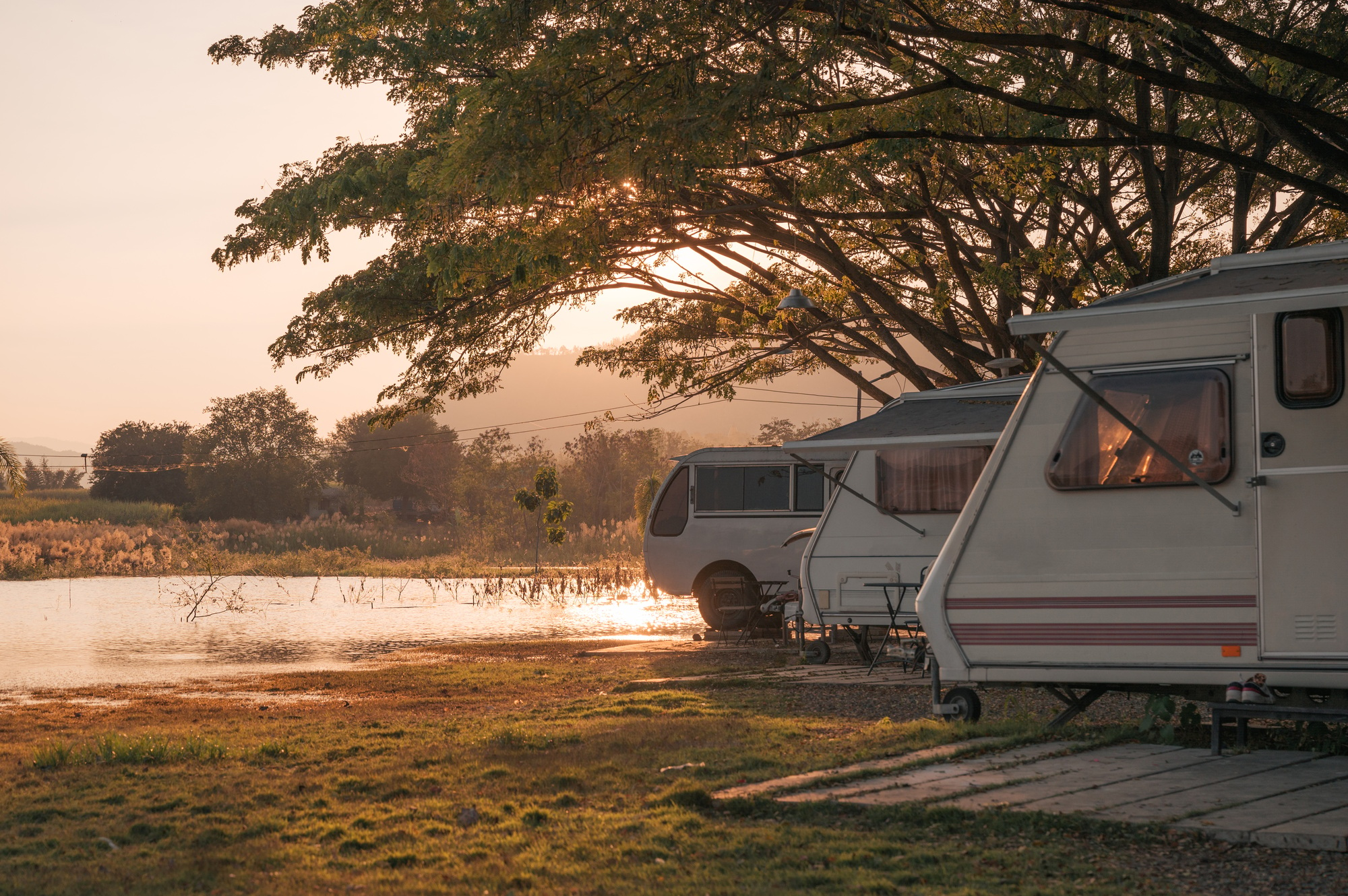
Managing your campground is like conducting a symphony; every element must harmonize to create unforgettable experiences for your guests. Start with a strong business plan, your guiding map through the campground industry.
Initial, pinpoint your target market. Are you attracting families excited for tent sites or RV enthusiasts?
Understanding your audience shapes everything—from campground service buildings to outdoor activities. For families, consider hosting outdoor movie nights or community events. These activities create lasting memories and encourage repeat visits.
Next, don’t forget location is critical. The ideal spot should be near natural attractions like hiking trails or national parks. This not only enhances the camping experience but also draws in customers. Be sure to steer local zoning laws and secure necessary building permits to make sure compliance.
Once your location is secured, evaluate your startup costs. This includes essentials like water supply, septic systems, liability insurance, and capital expenditure budgets. If funds are limited, consider small business loans. A well-structured budget helps you sidestep financial pitfalls.
As you develop your campground, prioritize customer experience. Make sure clean bathroom facilities and a well-stocked camp store. Adding amenities like a swimming pool or fire pits can distinguish your campground from the competition.
At last, use the power of marketing. Craft a marketing plan that highlights your unique offerings. Use social media to promote upcoming events and special deals, attracting potential customers and testing them engaged.
Managing your campground requires meticulous planning and execution. By understanding your market, securing the right location, budgeting wisely, and enhancing customer experience, you can cultivate a thriving campground that brings joy to many.
Hire staff and train them on customer service and operations
Hiring staff for your campground is like building a championship team—each member is critical in creating an unforgettable experience. Training them in customer service is critical; after all, happy campers are like dynamic flowers that attract more visitors!
Empower your team with in-depth knowledge of the campground industry, including local attractions and upcoming events. This expertise enables them to answer questions confidently and craft memorable experiences. Engage both staff and campers by hosting community events, such as outdoor movie nights, to nurture a strong sense of connection.
Investing in your team’s skills is akin to nurturing a garden; it cultivates growth and leads to a thriving campground business. With effective training, your staff can turn every camper’s visit into a cherished memory.
Do a reservation and booking system
Implementing a reservation and booking system is like constructing a solid bridge; it connects your campground to efficiency and customer satisfaction. For campground owners, this system is critical for managing tent sites and RV sites effectively.
Think of it as the backbone of your campground business plan, ensuring smooth operations from community events to outdoor movie nights. Are you ready to transform your campground experience?
Providing a Unique Camping Experience
Starting a campground is like planting a seed in fertile soil; with the right care, it can blossom into a thriving venture. How do you make your campground stand out in a crowded market?
The key is to provide a unique camping experience that resonates with your audience.
Begin by identifying your target market. Are you appealing to families craving weekend getaways, thrill-seekers in search of hiking trails, or glamping aficionados?
Understanding your audience is critical. Just as a chef designs a menu to delight diners, you should tailor your campground to meet your guests’ needs.
Next, develop a strong business plan that clearly outlines your vision. This plan should include capital expenditure budgets for necessary infrastructure, such as bathroom facilities, a camp store, and septic systems. A solid foundation is critical for long-term success.
When evaluating startup costs, consider the land size you need. A larger area allows for more RV sites and tent sites, but it also requires a larger initial investment. Research local zoning laws and secure necessary permits, like building and signage permits, to avoid unexpected fines.
Effective marketing is necessary. Create an appealing website and use social media to showcase your unique offerings. Do SEO strategies to drive traffic, much like a lighthouse guiding ships to shore. A well-crafted marketing plan will not only attract customers but also encourage repeat visits.
At last, focus on exceptional customer service. Just as a warm campfire invites stories and laughter, a welcoming atmosphere will make your campground feel like home. Engage with guests, seek feedback, and continually improve their experience. Remember, a happy camper is likely to return, bringing friends and family along for the adventure!
Offer a range of accommodations, including glamping options
Lift your camping experience with a diverse array of accommodations, including glamping options. Imagine immersing yourself in nature’s splendor while relaxing in a luxurious tent, complete with plush bedding and modern conveniences. Glamping captivates everyone—from families to adventure seekers—making it a compelling attraction for your campground business. It calls those who might shy away from traditional camping to accept the great outdoors.
By offering these varied accommodations, you improve the camping experience and align with current recreational trends. With targeted marketing strategies, you can attract adventurous customers excited for unique outdoor experiences, ensuring the dynamic success of your new campground.
Partner with local organizations to offer activities and events
Partnering with local organizations can turn your campground into a lively destination. Imagine hosting outdoor movie nights or dynamic community festivals that not only draw visitors but also create unforgettable experiences. By collaborating with local businesses, you improve your campground’s appeal and nurture a strong sense of community. How can these partnerships attract more potential customers to your campground business?
These initiatives not only improve the camping experience but also strengthen ties within the tourism industry. Think of it as planting seeds; the more you nurture these relationships, the more your campground will flourish.
Technology and Digital Tools
Starting a campground is like building a bridge to the great outdoors, requiring strategic planning and the right digital tools. What technologies can transform your campground into a must-visit destination for nature enthusiasts?
1. Research and Design: Begin with a complete market analysis. What type of campground do you envision?
Explore existing campgrounds and their offerings. Are there enough RV sites or tent sites? Use online resources to design your campground layout, ensuring it meets local building codes and zoning laws.
2. Business Plan: Create a solid business plan outlining your mission, target market, and operational strategies. Include capital expenditure budgets to estimate startup costs. A well-structured plan can attract small business loans or investors, helping you realize your vision.
3. Permits: Before construction, secure necessary building permits and business licenses. This may also include signage permits to increase your campground’s visibility. Are you aware of the environmental regulations?
Stay updated on environmental protection laws concerning water supply and waste management.
4. Digital Tools: Invest in reservation systems and online booking platforms to streamline customer interactions. This technology enhances the customer experience and makes your campground more appealing. Plus, consider digital signage to promote upcoming events or local attractions.
5. Community Engagement: Host community events like outdoor movie nights or guided hikes to attract visitors. Collaborate with local organizations to increase your visibility and create memorable experiences for campers. How will you integrate these events into your marketing strategy?
6. Maintenance and Safety: Regular campground maintenance is critical. Keep facilities like restrooms, swimming pools, and camp stores in excellent condition. Consider obtaining liability insurance to protect your business and guests. Are you prepared to face challenges such as road upkeep or electrical repairs?
By leveraging technology and digital tools, you can lift your campground into a sought-after haven for campers, providing unforgettable experiences. Is your campground ready to become the ultimate destination for outdoor adventures and relaxation?
Do digital payment systems and online check-in
Implementing digital payment systems and online check-in is like giving your campground a magic key to convenience. Imagine guests arriving and, instead of waiting in long lines, checking in with just a few taps on their phones. Isn’t that a game-changer?
These systems streamline operations, allowing campground owners to effortlessly manage reservations and payments. With a strong setup, you improve the customer experience, attract more visitors, and reduce startup costs by minimizing staffing needs. It’s like upgrading from a flip phone to a smartphone—everything becomes simpler!
By leveraging mobile apps and online booking, you not only cater to today’s tech-savvy campers but also gather valuable data for market analysis. This insight helps you understand your target market and tailor offerings, such as hosting outdoor movie nights or special community events.
Accepting these technologies isn’t just about testing up; it’s about leading the charge in the campground industry. Are you ready to step into the future?
Monitor and analyze customer data to improve services
To lift your campground’s services, monitoring and analyzing customer data is critical. Think of it as a treasure map; the more details you gather, the easier it is to uncover hidden gems that improve guest experiences. Are visitors raving about the swimming pool or the outdoor movie nights? Use this feedback to refine your offerings and attract more guests.
By harnessing technology and digital tools, you can create a campground that resonates with your target audience, setting the stage for a successful entrepreneurial journey.
Launching and Growing Your Campground
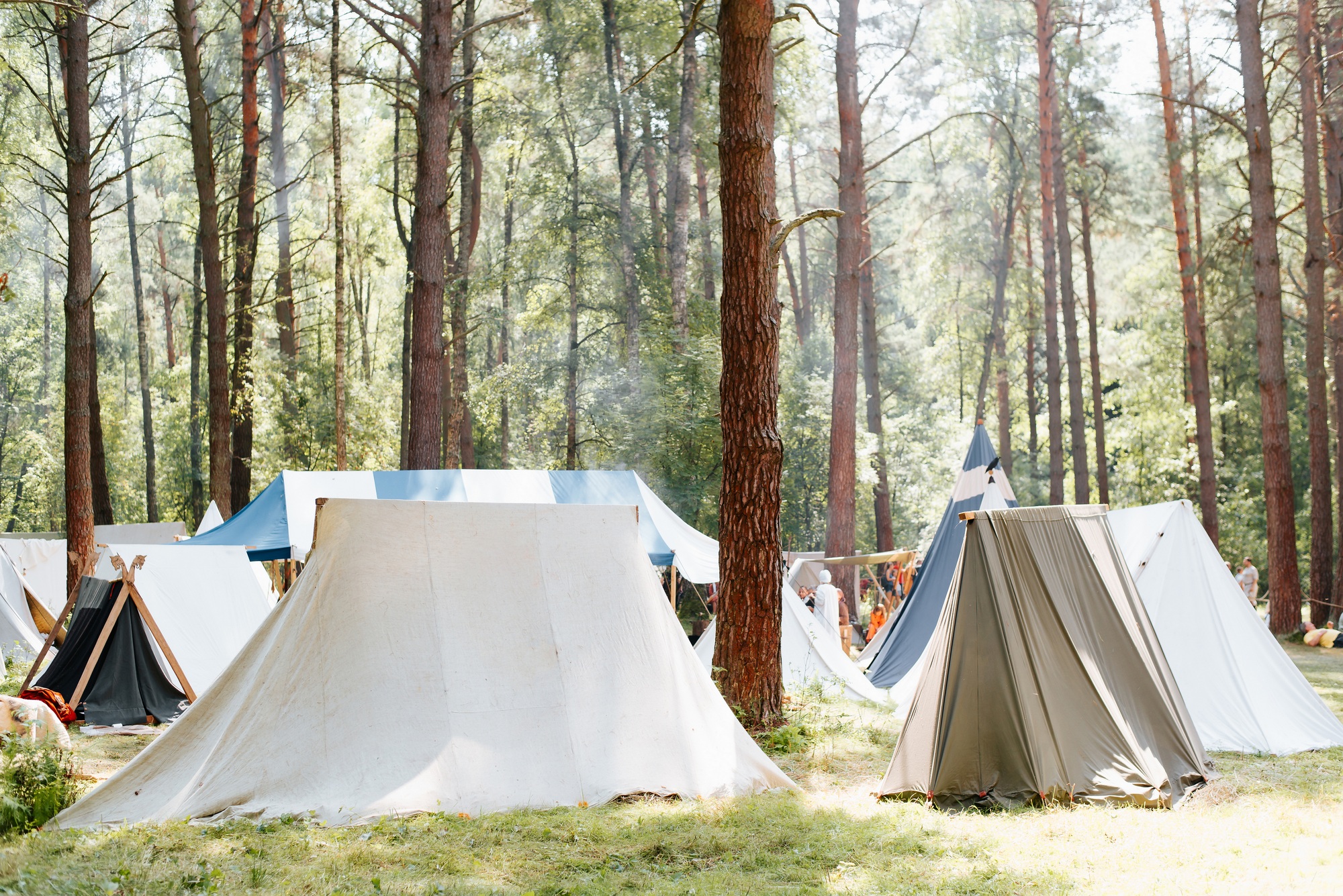
Launching a campground is like Begining on an exhilarating adventure. Picture transforming a piece of land into a dynamic community where families forge unforgettable memories. But how do you turn this dream into reality?
Here’s your roadmap to successfully launch and grow your campground.
Step 1: Research and Planning – Before diving in, conduct thorough research. What type of campground do you envision?
An RV park, a tent site paradise, or a mix of both?
Understanding your target market is critical. Are you catering to families, solo adventurers, or eco-tourists?
This insight will shape your business plan.
Step 2: Location, Location, Location – Finding the right location is like discovering the missing piece of a puzzle. Look for sites near natural attractions such as hiking trails or lakes. Make sure compliance with local zoning laws and building permits. How much land do you need?
A good rule of thumb is about 10 acres for a small campground.
Step 3: Financial Planning – A solid financial foundation is critical for starting your campground. Estimate your startup costs, including land acquisition, infrastructure, and amenities like bathrooms and a camp store. Small business loans can help, but prepare a detailed capital expenditure budget to track expenses effectively.
Step 4: Design and Development – With location and funds secured, it’s time to design your campground. Plan the layout: where will you place RV sites, tent sites, and service buildings? Consider adding engaging features like a recreation room or outdoor movie nights to attract visitors.
Step 5: Marketing Your Campground – Now that everything is in place, it’s time to spread the word. Build an appealing website and use social media to connect with potential customers. Highlight local attractions and upcoming events to entice visitors. A strong online presence is necessary in today’s tourism place.
Step 6: Operations and Management – Running a campground is an ongoing journey. Regularly gather guest feedback to improve services. Host community events to build relationships with visitors and improve their camping experiences. Don’t overlook the importance of maintaining electrical systems and road upkeep for safety.
By following these steps, you can transform your vision into a thriving campground. Are you ready to begin on this exciting entrepreneurial journey?
| Key Steps | Description |
|---|---|
| Research and Planning | Identify your target market and campground type. |
| Location Selection | Choose a site near natural attractions and check zoning laws. |
| Financial Planning | Estimate startup costs and explore funding options. |
| Design and Development | Plan the layout and amenities of your campground. |
| Marketing | Create a website and promote your campground online. |
| Operations | Manage daily operations and gather guest feedback. |
Continuously evaluate and improve services and amenities
To make sure your campground flourishes, you must continuously evaluate and improve services and amenities. Picture your campground as a dynamic garden; without regular care, it risks becoming overrun with weeds. How can you entice visitors if your facilities feel outdated?
By nurturing your campground, you create a welcoming atmosphere that fosters repeat visits. Remember, a satisfied camper is a loyal camper!
Staying Competitive in the RV Parks Market
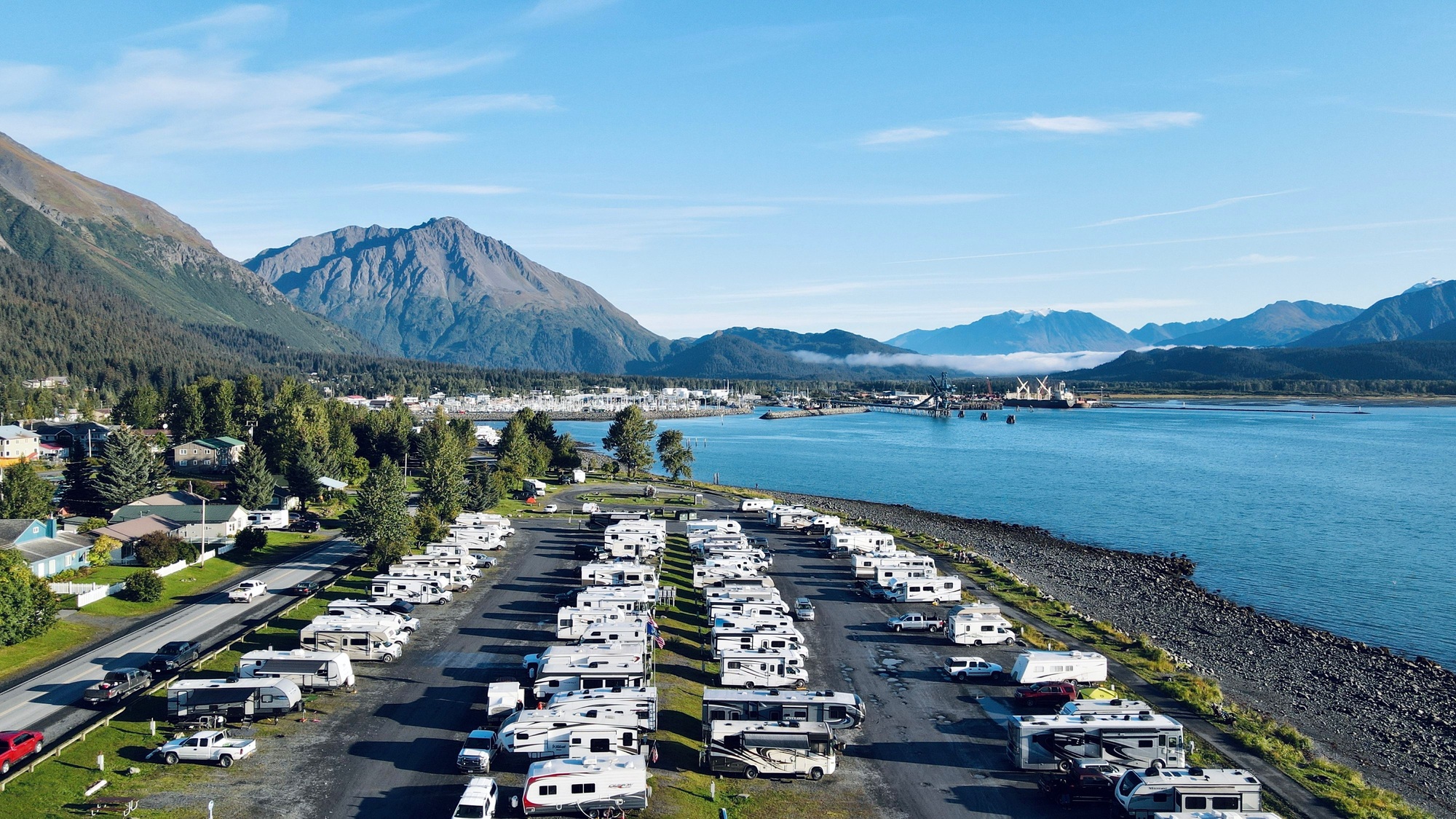
Staying competitive in the RV parks market is like finding your way a winding trail—you need direction, insight, and readiness for the unexpected. How can your campground truly stand out?
Start with a solid business plan as your compass. Conduct a thorough market analysis to identify your target market. Are you catering to families seeking fun or adventure enthusiasts craving hiking trails?
Understanding your audience allows you to tailor your offerings, whether that’s tent sites or RV sites.
Next, evaluate your location. Is your campground near popular natural attractions or national parks? Proximity to these hotspots remarkably boosts your chances of attracting visitors—like choosing the perfect spot to pitch a tent!
Amenities are necessary. Unique features such as a camp store, swimming pool, or outdoor movie nights can improve the customer experience. These are the cherries on top that make your campground irresistible.
Stay attuned to market trends. Is eco-friendly camping gaining traction?
Accepting environmental sustainability not only attracts customers but also showcases your commitment to the planet.
Regarding regulations, make sure you have all the necessary permits, including building permits and business licenses. Ignoring local zoning laws can lead to costly setbacks, much like hiking a trail without a map.
At last, engage with your community. Hosting upcoming events or partnering with local organizations can create buzz and draw visitors. Think of it as building a bridge to connect with potential customers.
In the RV parks market, success relies on strategic planning, audience understanding, and unique experiences. Focus on these elements to cultivate a thriving campground that attracts visitors year-round.
Monitor customer feedback and reviews
Monitoring customer feedback and reviews is your guiding star in the entrepreneurial place. How can you chart a course in the vast campground industry without grasping your guests’ true sentiments?
Actively seeking their insights not only enriches their camping experiences but also sharpens your edge in the competitive RV parks market.
Picture yourself as a camper—wouldn’t you want your voice to connect?
Engaging with reviews reveals opportunities for enhancement, whether it’s improving bathroom facilities or elevating outdoor movie nights. View feedback as a trigger for growth, ensuring your campground business thrives amidst shifting recreational trends.
By tuning into your guests, you nurture a loyal community, transforming initial-time visitors into devoted patrons. Isn’t that the ultimate aspiration for every successful campground owner?
Summing up
Launching your own campground is an exhilarating adventure. Picture transforming a simple piece of land into a lively haven for nature enthusiasts. Start by selecting the ideal location—this is the heartbeat of your campground. Who are the adventurers excited to explore your space?
Understanding your target market is critical. Equip your campground with attractive and functional amenities, much like a well-stocked toolbox ready for any challenge. Stay alert to market trends and engage actively with your community, nurturing relationships that inspire loyalty. With strategic planning and a genuine passion for the outdoors, your dream campground can thrive. Prepare yourself to welcome guests and create unforgettable camping experiences!
Frequently Asked Questions
What are the three types of campsites?
en: The three types of campsites are tent sites, RV sites, and cabin rentals, catering to diverse camping preferences and experiences.
How profitable is owning a campground?
Owning a campground can be profitable, with potential for steady income from rentals, amenities, and events, especially in prime locations.
How can I effectively market my campground to potential visitors?
Create a user-friendly website, use social media, optimize for SEO, and engage with local attractions to attract visitors.
What are the best practices for maintaining a campground to make sure visitor satisfaction?
en: Keep facilities clean, provide friendly service, make sure safety, offer activities, and gather feedback to continuously improve.


